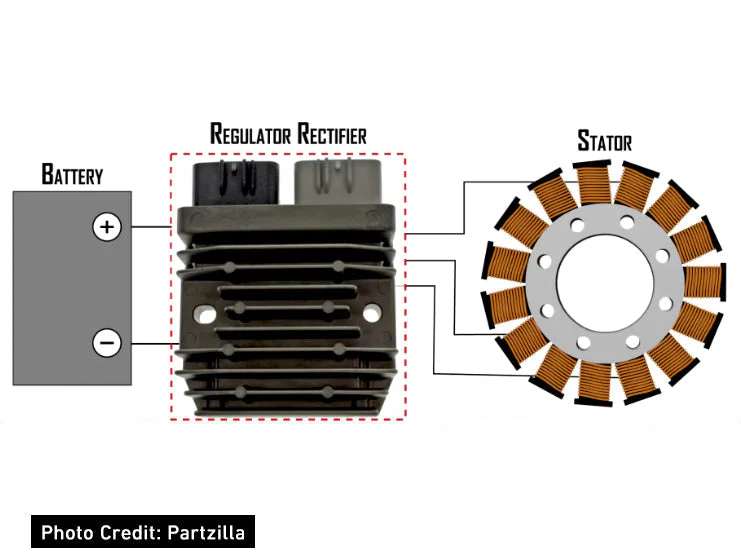Table of Content
If you are experiencing problems with the battery and electrical equipment on your motorcycle, there can be several issues with your bike, including a failing regulator rectifier. It is one of the most common issues that happen with motorcyclists but only a few know about this. So, the next time you experience issues such as your bike not starting, your battery draining quickly, and dim lights, there is a higher chance that the regulator rectifier is bad. Read this article to learn about the multiple symptoms of a bad regulator rectifier on a motorcycle.
1. What Is the Purpose of a Regulator Rectifier on a Motorcycle?
Regulator Rectifier

A regulator rectifier includes two separate electrical components combined to form a single piece of equipment. Regardless of its small size, a regulator rectifier performs a key role in the motorcycle charging system. There are several electronic components installed on a motorcycle, without which you cannot ride safely on the road, especially at night. These components include a headlight, tail light, turn signals, TFT screen display, and other electrical accessories depending on the motorcycle you own.
To produce an electric current in the motorcycle, an alternator is used, which consists of coils and magnetic wires. The current produced by the alternator is alternating, which is not suitable for charging a DC battery installed in a motorcycle to power the electronics. Therefore, to ensure the battery is charged properly by receiving a proper amount of DC, a regulator rectifier is used.
The regulator rectifier has two major components: a rectifier and a regulator. First, the current passes through the rectifier, which converts the AC voltage to DC voltage. Then this rectified DC voltage goes through the regulator, which stabilizes and regulates the voltage at a certain level to charge the battery, usually between 14 V to 14.5 V.
2. What Can Happen if Your Motorcycle Has a Bad Rectifier Regulator?
Before a motorcycle completely stops working due to a bad rectifier regulator, several issues can arise. Firstly, the battery will not charge, and the electrical components will start to malfunction. The battery will eventually drain quickly and become dead.
3. Symptoms of Bad Regulator Rectifier on a Motorcycle
Sometimes, it is difficult to figure out the issue with the motorcycle when it does not work properly. The same is the case with the regulator rectifier. You will not be able to identify a bad regulator rectifier until you perform some specialized test. However, there are several symptoms you must know that indicate a bad regulator rectifier.
3.1 Excessive Battery and Regulator Heating
One difficult-to-spot symptom of a bad regulator rectifier in a motorcycle is the overcharging battery issue because the regulator stopped working. Irregular supply can cause the overcharging of the battery, resulting in both the battery and the regulator rectifier becoming overheated. If you can test the area that holds the battery and rectifier, the temperature can let you know whether your regulator rectifier is malfunctioning.
3.2 Dim Lights
If the lighting on your motorcycle is getting dimmer over time, it can be due to a bad regulator rectifier that is failing to charge the battery properly.
3.3 Electronic Equipment Failure
If the electronic equipment installed on your motorcycle, including lighting, indicators, horn, TFT screen display, electronic fuel injection system, and ignition is failing or malfunctioning, it is an indication that the regulator rectifier is malfunctioning.
3.4 Motorcycle Starting Issue
The reason your motorcycle is failing to start completely or takes a lot of time to turn on could be a faulty regulator rectifier. Your battery is probably drained or failing to provide the initial current needed to start your motorcycle.
3.5 Dead Battery
If your motorcycle battery remains dead most of the time and is unable to provide electric power to the electronics installed on your motorcycle, there is a high chance that your regulator rectifier is faulty.
4. How to Check if the Regulator Rectifier Has Gone Bad?
4.1 How to Check the Rectifier Using a Multimeter
Apart from the symptoms of a bad regulator rectifier, there are other ways to check the functioning and health of a regulator rectifier. All you need is a multimeter to check the voltage. The diode can be easily checked by setting the multimeter’s knob to the diode, placing the positive lead of the multimeter on the positive terminal of the battery, and placing the negative lead of the multimeter on the negative sides of all the three terminals of the diode. If the multimeter’s screen displays a volt reading of 0 V, it means that your rectifier is in good condition.
To double-check the rectifier, repeat the whole procedure by connecting the multimeter’s negative cable to the negative terminal of the battery. Similarly, connect the positive cable to each of the three terminals on the diode one by one. If the reading on the multimeter screen again reads 0 V, the rectifier is good.
Now, reverse the polarity by attaching the positive cable of the multimeter to the negative terminal of the battery and the negative cable of the multimeter to each of the three terminals of the diode one by one. If the multimeter’s screen displays a voltage reading of 0.5 V, it means that your rectifier is in good condition.
Similarly, repeat the process by placing the negative cable of the multimeter on the positive terminal of the battery and the positive cable of the multimeter to each of the three terminals of the diode one by one. If it displays a reading of 0.5 V, the rectifier is good.
4.2 How to Check the Regulator Using a Multimeter
To check whether the regulator on a motorcycle is good, you will have to check the battery’s voltage. Make sure your motorcycle’s engine is turned on when you check your motorcycle’s battery voltage. Set the multimeter’s knob on the DC Voltage setting, and place the negative cable of the multimeter on the negative terminal of the battery, and the positive cable of the multimeter on the positive terminal of the battery. The multimeter’s screen should display a voltage reading of 12 V to 14 V. Anything above 14 V and below 12 V means that the regulator is faulty.
If the regulator rectifier on your motorcycle turns out to be in bad condition, replace it to ensure your motorcycle and the electronics installed on it operate smoothly.
5. The Bottom Line
A bad regulator rectifier on a motorcycle can cause you much trouble, as it is a key component in a motorcycle’s electrical system. Without a working regulator rectifier, your motorcycle’s electronics equipment will not work and you will not be able to start your motorcycle. The regulator rectifier helps charge your motorcycle battery. The rectifier converts the alternating current into direct current, and the regulator stabilizes the voltage level by maintaining its magnitude to avoid overcharging. It may be a small component on your motorcycle, but it performs one of the major tasks to keep your motorcycle running. Therefore, you must keep checking the regulator rectifier on your motorcycle if you feel that there is some issue with your motorcycle electronics. With the help of the symptoms listed in this article and using the multimeter, you can confirm if there is something wrong with the regulator rectifier on your motorcycle. Replace the regulator rectifier on your motorcycle if it is out of order.
You must keep your motorcycle in good shape and your electronics must be fully functional, especially if you use your motorcycle for touring. Apart from a functional battery and working regulator rectifier, your motorbike must be equipped with useful touring parts to make you feel good and comfortable while touring. Viking Bags offers you high-quality motorcycle parts, like the fairings, sissy bars, highway bars, and backrest to improve your touring comfort. You can also carry useful stuff on your motorbike while going on a tour with the help of the variety of luggage bag options available at the Viking Bags’ online store. These include tank bags, saddlebags, backpacks, handlebar bags, and more.












Leave a comment
All comments are moderated before being published.
This site is protected by hCaptcha and the hCaptcha Privacy Policy and Terms of Service apply.